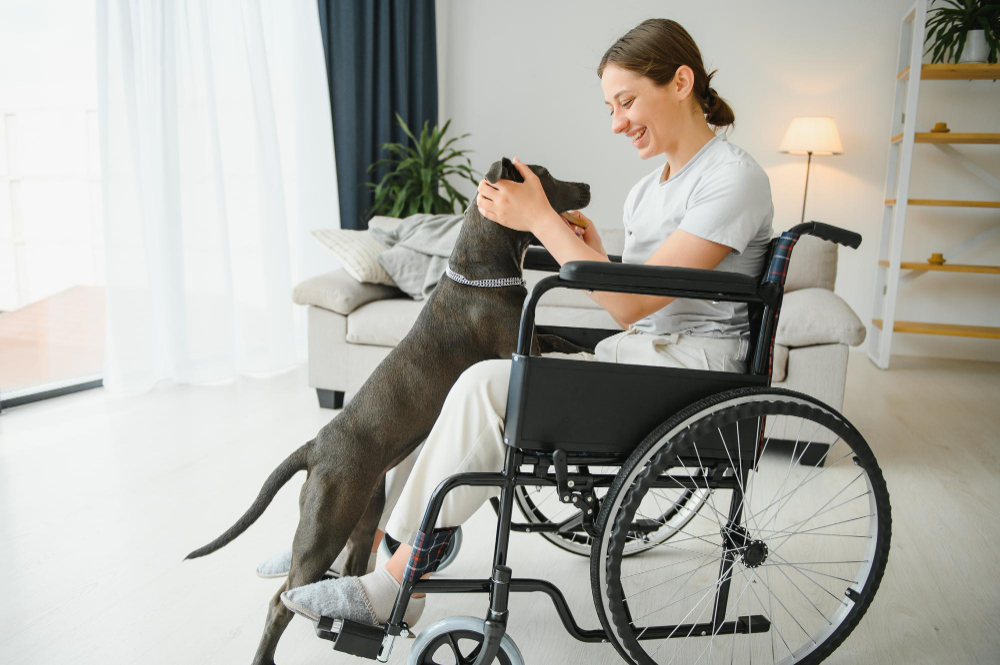Can My Strata Prevent Me From Having An Emotional Support Dog?
With the state of the world today and progress in mental health research, the use of service animals has been on the rise. Owners of emotional support dogs often speak about the benefits their pets offer in reducing stress and anxiety, helping them to complete daily tasks much easier. In fact, almost 80 per cent of B.C. residents favour legislation that allows pet guardians the right to keep companion animals, according to a 2008 poll held by the BCSPCA.
These days it is not uncommon to see therapy animals in hospitals, university campuses, and airports. Even with the progress in mental health research and therapy animals, not all service animals are treated the same.
When most people talk about service animals, people often think of seeing-eye dogs or other service dogs for people’s physical limitations. However, there has been a steady increase in people having animals for emotional support.
Despite the fact that pets have proven psychological, physiological and social benefits to humans many stratas have restrictive rules around pet ownership. We’re hopeful this blog can help you if you’re in the difficult position of your strata is attempting to prevent you from having an emotional support animal.
Is My Pet A Service Dog?
Under the Accessible Transportation for Persons with Disabilities Regulations, a service dog is defined as “a dog that has been individually trained by an organization or person specializing in service dog training to perform a task to assist a person with a disability with a need related to their disability.”
According to the Government of Canada, service and guide dogs are different from emotional support animals because service and guide dogs receive special training to perform specific task to support people. Furthermore, when it comes to transportation, the Government of Canada says that major Canadian carrier can refuse to accept emotional support animals on board, but not service or guide dogs.
British Columbia has a specific act regulation to use of guide dogs and service dogs called the Guide Dog and Service Dog Act. This Act governs how guide and service dogs (and their handlers) are certified. This Act further defines service dog to mean a dog that is trained to perform specific tasks to assist a person with a disability and is certified as a service dog.
Currently in British Columbia, there are no formal certification processes for emotional support dogs.

What Are My Rights With A Service Or Guide Dog?
Under the Guide Dog and Service Dog Act, business owners, government buildings, and any other place, accommodation, or building that the public is invited or has access to cannot prevent the guide dog, the service dog, whether in training or not, from entering those areas (section 2).
In addition, under this Act, a person may not deny a guide dog or service dog from a manufactured home site or rental unit or impose terms or conditions for the tenancy. Note that this does not apply to rental units that may entail sharing sleeping, bathroom or cooking facilities in the space with an individual from another family.
If a person contravenes either of those sections, that person has committee an offence and could be liable for a fine up to $3,000. On the other side, a person who passes off a pet as an assistance animal could be liable for fine of up to $3,000.
In British Columbia, the Strata Property Act regulates the relationship between stratas and their owners/tenants. Under section 123 of the Strata Property Act, a strata bylaw that prohibits a pet or that restricts the access of a pet does not apply to guide dogs, retired guide dogs or service dog teams or service dogs as defined in the Guide Dog and Service Dog Act.
Under British Columbia’s Human Rights legislation, the Human Rights Code, there is a duty for strata corporations and other service providers to accommodate designated classes including people with disabilities. The duty to accommodate may include allowing strata owners and residents to have therapy or companion animals.
Under section 8 of the Human Rights Code (the “Code”), stratas are prohibited from enforcing or applying their bylaws in a way that discriminates against a person based on a disability, including physical or mental disability. (Kallstrom v Strata Plan BCS 1437 and others, 2019 BCHRT 215 at para 17).
If your emotional support dog aids you with a characteristic protected by the Code, your strata may be ordered to provide accommodation for you and your emotional support dog.
I Think My Strata Violated My Right to An Emotional Support Animal. What Can I Do?
The first step is to determine whether you will go through the Civil Rights Tribunal or Human Rights Tribunal.
The Civil Rights Tribunal deals with most Strata issues; however, if your claim involves a violation against the Human Rights Code, you can also go through the Human Rights Tribunal.
The Civil Rights Tribunal can decline to apply the Human Rights Code, so it is important to speak with a lawyer prior to deciding which tribunal to make your claim in.
In deciding which tribunal, you will also want to look at how long the total process will take.
According to the Civil Rights Tribunal, between April 1, 2020 and March 31, 2021, the average time to resolution was:
| Total # of Days Since Claim was Filed | |
| Claim settled by negotiation or facilitation | 49 |
| Claim resolved by default decision | 57 |
| Claim resolved by CRT decision | 164 |
According to the BC Human Rights Tribunal FAQ Page, the Human Rights Tribunal can take up to 6 months to provide a decision.
In order to succeed in a Human Right Code violation dispute, the person making the complaint must prove that:
- The person has a characteristic protected by the Code;
- That the Respondent’s conduct caused an adverse impact in a protected area; and
- That the protected characteristic was a factor in the adverse impact
[See Moore v. British Columbia, 2012 SCC 61 [Moore] at para. 33]
If the person making the complaint proves those three elements, then the burden shifts to the Respondents to justify their conduct: Moore at para. 33.

How Do I Show My Strata Or The Tribunal That My Dog Is An Emotional Support Dog?
In the Human Rights Tribunal Decision of Lylack v. The Owners, Strata Plan Number LMS1755 and others, 2022 BCHRT 16L, the tribunal provided a general guidance to parties requesting accommodation, including those that may involve exceptions to Strata bylaws.
The person seeking accommodation must:
- Provide enough information for the strata council to understand the person has a disability that is negatively impacted; and
- Cooperate with the strata to provide sufficient medical information. This may include a medical report. A brief doctor’s note on a prescription pad will probably not be comprehensive enough to establish the need for accommodation.
In turn, the strata council must:
- Address requests for accommodation promptly and take them seriously. The Strata is entitled to request medical information that is related to the request for accommodation. It is not entitled to any more information than is strictly necessary for this purpose. If the strata requests further medical reports, it should be at the strata’s expense.
- Restrict access to a person’s medical information to only those individuals who are involved in the accommodation process and who need to understand the underlying medical information. The strata council should keep medical information confidential from the general membership of the strata.
- Recognize that it cannot rely on a vote of its membership to deny an accommodation.
As similar analysis was used in the Civil Rights Tribunal of Lenius v. The Owners, Strata Plan KAS 2959, 2022 BCCRT 515, where the tribunal found the strata Mr. Lenuis’ and his wife, Ms. Schlosser’s three (3) cats were emotional support animals based on the following evidence:
- A letter from a licensed Saskatchewan social worker stating that the cats were an integral part of Ms. Schlosser’s treatment plan;
- A letter from a BC family physician that outlined Ms. Schlosser’s diagnosis and recommended that the animals be considered necessary to Ms. Schlosser’s mental health therapy and not be removed; and
- A letter from a Saskatchewan family doctor that diagnosed Ms. Schlosser and wrote that Ms. Schlosser found therapy in her 3 cats, which she has used since she was a teenager.
Do I Need To Go Right To A Tribunal To Dispute My Strata?
Short answer is no.
Before starting any legal action, including going to a Tribunal, you must first make the accommodation request to your strata council and provide them the necessary documents. If you do not know what documents you need, request that the strata council provide you with a list of the documents they need to review your request.
Only after strata council has reviewed and denied your accommodation request should you proceed to the Civil Rights Tribunal or the Human Rights Tribunal.
Please note that in most cases you will need to file your complaint to Civil Rights Tribunal in two years of the incident whereas the Human Rights Tribunal is within one year of the incident.
If you are unsure of the date of the incident, seek legal advice as soon as possible.
For more information or to set up a consultation with our animal loving, award-winning strata and animal law lawyers in Surrey or Vancouver, call us at 604-974-9529 or get in touch.